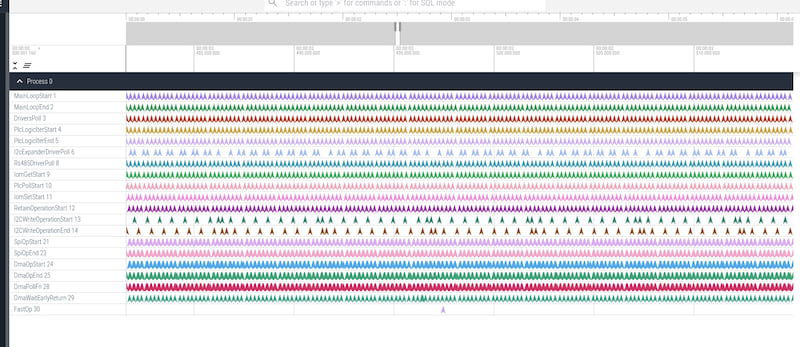9 releases
| 0.1.5 | Mar 9, 2025 |
|---|---|
| 0.1.4 | Sep 28, 2024 |
| 0.0.4 | Sep 14, 2024 |
| 0.0.1 | Aug 23, 2024 |
#74 in Profiling
130 downloads per month
Used in sparkles-parser
69KB
1.5K
SLoC
.・゜゜ 𝕊ℙ𝔸ℝ𝕂𝕃𝔼𝕊 ・゜゜・
Performance-focused library for capturing execution flow of your application.

What?
Simply add the instant_event! macro to your code with a string literal and you'll be able to view this event later on a timeline with CPU cycle precision.
How?
Fast. Blazingly fast. 🚀 Recording a single event incurs an overhead as low as 10ns and consumes only 3 bytes in the trace buffer (in dense tracing conditions).
˚ ༘ ⋆。˚ ✧ ˚ ༘ ⋆。˚ ༘ ⋆。˚ ✧ ˚ ༘ ⋆。˚˚ ༘ ⋆。˚ ✧ ˚ ༘ ⋆。˚ ༘ ⋆。˚ ✧ ˚ ༘ ⋆。˚༘ ⋆。˚ ✧ ˚ ༘
Up to 🫸100_000_000🫷 events per second can be captured in a local environment with no data loss.
༘ ⋆。˚ ༘ ⋆。˚ ✧ ˚ ༘ ⋆。˚༘ ⋆。˚ ✧ ˚ ༘ ⋆。˚༘ ⋆。˚ ✧ ˚ ༘ ⋆。˚༘ ⋆。˚ ✧ ˚ ༘ ⋆。˚༘ ⋆。˚ ✧ ˚
✧ Main parts
- sparkles: Ready-to-use library for capturing events and saving them to file in lightweight encoded format.
- sparkles-core: Common functionality for std and no_std (todo) version of sparkles and protocol packets.
- sparkles-macro: instant_event! and range_event_start! macro to encode event name into integer value.
- sparkles-parser: Provides easy to use way of converting recorded trace data to Perfetto format as well as library for realtime parsing.
✧ How to use
- Add sparkles as a dependency to your project
cargo add sparkles
cargo add sparkles-macro
- Add some instant/range events to your code
use std::time::Duration;
use sparkles_macro::{instant_event, range_event_start};
// Refer to sparkles/examples/how_to_use.rs
fn main() {
let finalize_guard = sparkles::init_default();
let g = range_event_start!("main()");
let jh = std::thread::Builder::new().name(String::from("joined thread")).spawn(|| {
for _ in 0..100 {
instant_event!("^-^");
std::thread::sleep(Duration::from_micros(1_000));
}
}).unwrap();
std::thread::Builder::new().name(String::from("detached thread")).spawn(|| {
for _ in 0..30 {
instant_event!("*_*");
std::thread::sleep(Duration::from_micros(1_000));
}
}).unwrap();
for i in 0..1_000 {
instant_event!("✨✨✨");
std::thread::sleep(Duration::from_micros(10));
}
jh.join().unwrap();
}
- Run your code. As it finishes,
trace/*.sprkis generated. - Run sparkles-parser in the directory with
tracefolder.
cargo run --example interactive
- Go to https://ui.perfetto.dev and drag'n'drop resulting
.perffile. - Observe the result:

✧ Requirements
🌟 STD support
🌟 x86/x86_64/aarch64 architecture.
OR
🌟 Functioning Instant::now()
✧ Benches
Single event overhead on average x86 machine (Intel i5-12400) is 9ns.
✧ Implementation status
Ready:
🌟 Timestamp provider
🌟 Event name hashing
🌟 Perfetto json format compatibility (replaced with protobuf)
🌟 Ranges (scopes) support
🌟 Configuration support
🌟 Perfetto protobuf format support
🌟 Abstraction over events sending type (UDP/File)
🌟 Automatic timestamp frequency detection
🌟 aarch64 support
🌟 More explicit and recoverable packets with known pattern
🌟 Resistance to data loss during transmission
🌟 UDP real-time reader and parser library API
🌟 Better timestamp speed interpolation in parser
🌟 Sparkles-parser: read and parse in separate threads
TODO:
⚙️ Track changes in structs encoded/decoded by bincode
⚙️ Include git revision into build
⚙️ Option to run without additional bg thread
⚙️ Defmt support
⚙️ Additional attached binary data
⚙️ Option to limit total consumed TLS buffer allocation
⚙️ Module info support: full module path, line of code
⚙️ Async support
⚙️ NO_STD implementation
⚙️ tags / hierarchy of events
⚙️ Viewer app
⚙️ Multi-app sync
⚙️ Global ranges
⚙️ Measurement overhead self-test
Known issues and limitations
✧ Converting timestamp to nanosecond time only have local consistency. Long sessions (day and more) can go out of sync with system clock.
✧ Currently can have only 256 unique event names per thread
✧ Currently up to 256 opened but not closed ranges at a time are supported (mostly enough)
✧ No std support for now
✧ Naive handling for bad network conditions: if at least one packet lost, the whole tracing data packet is dropped.
✧ Cannot specify UDP address to listen on
✧ Proper using of sparkles-macro::range_event_start!("name") gives warning
✧ Timestamp wrap-around is not handled well (not an issue for 64-bit systems)
Crate features
✧ accurate-timestamps-x86 - Enable serialization for x86/x86_64 timestamps. Trade off timestamp accuracy for higher overhead (slightly).
✧ self-tracing - Add global buffer flushing events
。゚゚・。・゚゚。
゚。SkyGrel19 ✨
゚・。・
Dependencies
~9–16MB
~145K SLoC